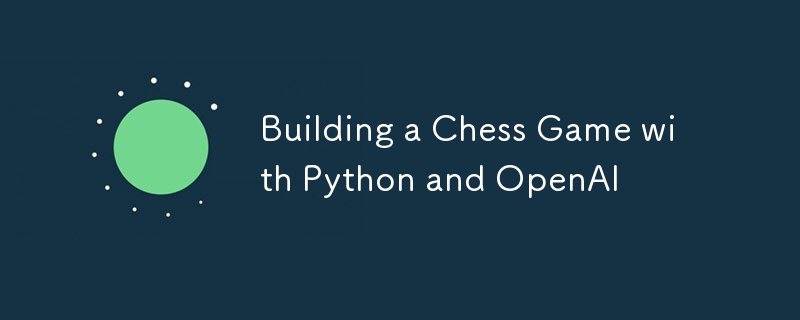使用 Python 和 OpenAI 建立國際象棋遊戲

只要週末有空閒時間,我就喜歡寫一些小而愚蠢的東西。其中一個想法變成了一款命令列國際象棋遊戲,您可以在其中與 OpenAI 對抗。我將其命名為“SkakiBot”,靈感來自“Skaki”,希臘語中的國際象棋單字。
優秀的 python-chess 函式庫負責所有的西洋棋機制。我們的目標不是從頭開始建立一個國際象棋引擎,而是展示 OpenAI 如何輕鬆地整合到這樣的專案中。
讓我們深入研究程式碼,看看它們是如何組合在一起的!
切入點
我們將首先設定一個基本的遊戲循環,該循環接受使用者輸入並為國際象棋邏輯奠定基礎。
def main():
while True:
user_input = input("Enter your next move: ").strip()
if user_input.lower() == 'exit':
print("Thanks for playing SkakiBot. Goodbye!")
break
if not user_input:
print("Move cannot be empty. Please try again.")
continue
print(f"You entered: {user_input}")
此時,程式碼沒有做太多事情。它只是提示用戶輸入、驗證並列印它:
Enter your next move: e2e4 You entered: e2e4 Enter your next move: exit Thanks for playing SkakiBot. Goodbye!
新增國際象棋庫
接下來,我們引入 python-chess,它將處理棋盤管理、移動驗證和遊戲結束場景。
pip install chess
安裝庫後,我們可以初始化棋盤並在提示使用者輸入之前列印它:
import chess
def main():
board = chess.Board()
while not board.is_game_over():
print(board)
user_input = input("Enter your next move (e.g., e2e4): ").strip()
if user_input.lower() == 'exit':
print("Thanks for playing SkakiBot. Goodbye!")
break
新增移動驗證
為了使遊戲正常運行,我們需要驗證使用者輸入並向棋盤應用合法的移動。 UCI(通用國際象棋介面)格式用於移動,您可以在其中指定起始和結束方格(例如,e2e4)。
def main():
board = chess.Board()
while not board.is_game_over():
# ...
try:
move = chess.Move.from_uci(user_input)
if move in board.legal_moves:
board.push(move)
print(f"Move '{user_input}' played.")
else:
print("Invalid move. Please enter a valid move.")
except ValueError:
print("Invalid move format. Use UCI format like 'e2e4'.")
處理殘局
我們現在可以處理遊戲結束的場景,例如將死或僵局:
def main():
board = chess.Board()
while not board.is_game_over():
# ...
if board.is_checkmate():
print("Checkmate! The game is over.")
elif board.is_stalemate():
print("Stalemate! The game is a draw.")
elif board.is_insufficient_material():
print("Draw due to insufficient material.")
elif board.is_seventyfive_moves():
print("Draw due to the seventy-five-move rule.")
else:
print("Game ended.")
在這個階段,你為雙方效力。您可以透過嘗試 Fool's Mate 來測試它,並按照 UCI 格式執行以下動作:
- f2f3
- e7e5
- g2g4
- d8h4
這會導致快速將死。
整合 OpenAI
現在是時候讓人工智慧接管一邊了。 OpenAI 將評估董事會的狀態並提出最佳措施。
取得 OpenAI 金鑰
我們先從環境中取得 OpenAI API 金鑰:
# config.py
import os
def get_openai_key() -> str:
key = os.getenv("OPENAI_API_KEY")
if not key:
raise EnvironmentError("OpenAI API key is not set. Please set 'OPENAI_API_KEY' in the environment.")
return key
AI行動生成
接下來,我們寫一個函數來將棋盤狀態(以 Forsyth-Edwards Notation (FEN) 格式)發送到 OpenAI 並檢索建議的走法:
def get_openai_move(board):
import openai
openai.api_key = get_openai_key()
board_fen = board.fen()
response = openai.ChatCompletion.create(
model="gpt-3.5-turbo",
messages=[
{"role": "system", "content": (
"You are an expert chess player and assistant. Your task is to "
"analyse chess positions and suggest the best move in UCI format."
)},
{"role": "user", "content": (
"The current chess board is given in FEN notation:\n"
f"{board_fen}\n\n"
"Analyse the position and suggest the best possible move. Respond "
"with a single UCI move, such as 'e2e4'. Do not provide any explanations."
)}
])
suggested_move = response.choices[0].message.content.strip()
return suggested_move
提示很簡單,但它可以很好地產生有效的動作。它為 OpenAI 提供了足夠的上下文來了解董事會狀態並以 UCI 格式的合法舉措進行回應。
棋盤狀態以 FEN 格式發送,它提供了遊戲的完整快照,包括棋子位置、輪到誰、易位權和其他詳細資訊。這是理想的,因為 OpenAI 的 API 是無狀態的,並且不會保留請求之間的信息,因此每個請求必須包含所有必要的上下文。
目前,為了簡單起見,該模型被硬編碼為 gpt-3.5-turbo,但最好從環境中取得它,就像我們對 API 金鑰所做的那樣。這將使以後更容易更新或使用不同的模型進行測試。
最終遊戲循環
最後,我們可以將人工智慧整合到主遊戲循環中。 AI 在每個用戶移動後評估棋盤並播放其回應。
def main():
while True:
user_input = input("Enter your next move: ").strip()
if user_input.lower() == 'exit':
print("Thanks for playing SkakiBot. Goodbye!")
break
if not user_input:
print("Move cannot be empty. Please try again.")
continue
print(f"You entered: {user_input}")
就是這樣!現在您已經有了一個功能齊全的國際象棋遊戲,您可以在其中與 OpenAI 對抗。程式碼還有很大的改進空間,但它已經可以玩了。有趣的下一步是讓兩個人工智慧相互對抗,讓他們一決勝負。
程式碼可在 GitHub 上取得。祝實驗愉快!
以上是使用 Python 和 OpenAI 建立國際象棋遊戲的詳細內容。更多資訊請關注PHP中文網其他相關文章!

熱AI工具

Undresser.AI Undress
人工智慧驅動的應用程序,用於創建逼真的裸體照片

AI Clothes Remover
用於從照片中去除衣服的線上人工智慧工具。

Undress AI Tool
免費脫衣圖片

Clothoff.io
AI脫衣器

Video Face Swap
使用我們完全免費的人工智慧換臉工具,輕鬆在任何影片中換臉!

熱門文章

熱工具

記事本++7.3.1
好用且免費的程式碼編輯器

SublimeText3漢化版
中文版,非常好用

禪工作室 13.0.1
強大的PHP整合開發環境

Dreamweaver CS6
視覺化網頁開發工具

SublimeText3 Mac版
神級程式碼編輯軟體(SublimeText3)
 Python:遊戲,Guis等
Apr 13, 2025 am 12:14 AM
Python:遊戲,Guis等
Apr 13, 2025 am 12:14 AM
Python在遊戲和GUI開發中表現出色。 1)遊戲開發使用Pygame,提供繪圖、音頻等功能,適合創建2D遊戲。 2)GUI開發可選擇Tkinter或PyQt,Tkinter簡單易用,PyQt功能豐富,適合專業開發。
 Python與C:學習曲線和易用性
Apr 19, 2025 am 12:20 AM
Python與C:學習曲線和易用性
Apr 19, 2025 am 12:20 AM
Python更易學且易用,C 則更強大但複雜。 1.Python語法簡潔,適合初學者,動態類型和自動內存管理使其易用,但可能導致運行時錯誤。 2.C 提供低級控制和高級特性,適合高性能應用,但學習門檻高,需手動管理內存和類型安全。
 Python和時間:充分利用您的學習時間
Apr 14, 2025 am 12:02 AM
Python和時間:充分利用您的學習時間
Apr 14, 2025 am 12:02 AM
要在有限的時間內最大化學習Python的效率,可以使用Python的datetime、time和schedule模塊。 1.datetime模塊用於記錄和規劃學習時間。 2.time模塊幫助設置學習和休息時間。 3.schedule模塊自動化安排每週學習任務。
 Python vs.C:探索性能和效率
Apr 18, 2025 am 12:20 AM
Python vs.C:探索性能和效率
Apr 18, 2025 am 12:20 AM
Python在開發效率上優於C ,但C 在執行性能上更高。 1.Python的簡潔語法和豐富庫提高開發效率。 2.C 的編譯型特性和硬件控制提升執行性能。選擇時需根據項目需求權衡開發速度與執行效率。
 Python標準庫的哪一部分是:列表或數組?
Apr 27, 2025 am 12:03 AM
Python標準庫的哪一部分是:列表或數組?
Apr 27, 2025 am 12:03 AM
pythonlistsarepartofthestAndArdLibrary,herilearRaysarenot.listsarebuilt-In,多功能,和Rused ForStoringCollections,而EasaraySaraySaraySaraysaraySaraySaraysaraySaraysarrayModuleandleandleandlesscommonlyusedDduetolimitedFunctionalityFunctionalityFunctionality。
 Python:自動化,腳本和任務管理
Apr 16, 2025 am 12:14 AM
Python:自動化,腳本和任務管理
Apr 16, 2025 am 12:14 AM
Python在自動化、腳本編寫和任務管理中表現出色。 1)自動化:通過標準庫如os、shutil實現文件備份。 2)腳本編寫:使用psutil庫監控系統資源。 3)任務管理:利用schedule庫調度任務。 Python的易用性和豐富庫支持使其在這些領域中成為首選工具。
 學習Python:2小時的每日學習是否足夠?
Apr 18, 2025 am 12:22 AM
學習Python:2小時的每日學習是否足夠?
Apr 18, 2025 am 12:22 AM
每天學習Python兩個小時是否足夠?這取決於你的目標和學習方法。 1)制定清晰的學習計劃,2)選擇合適的學習資源和方法,3)動手實踐和復習鞏固,可以在這段時間內逐步掌握Python的基本知識和高級功能。
 Python vs. C:了解關鍵差異
Apr 21, 2025 am 12:18 AM
Python vs. C:了解關鍵差異
Apr 21, 2025 am 12:18 AM
Python和C 各有優勢,選擇應基於項目需求。 1)Python適合快速開發和數據處理,因其簡潔語法和動態類型。 2)C 適用於高性能和系統編程,因其靜態類型和手動內存管理。






